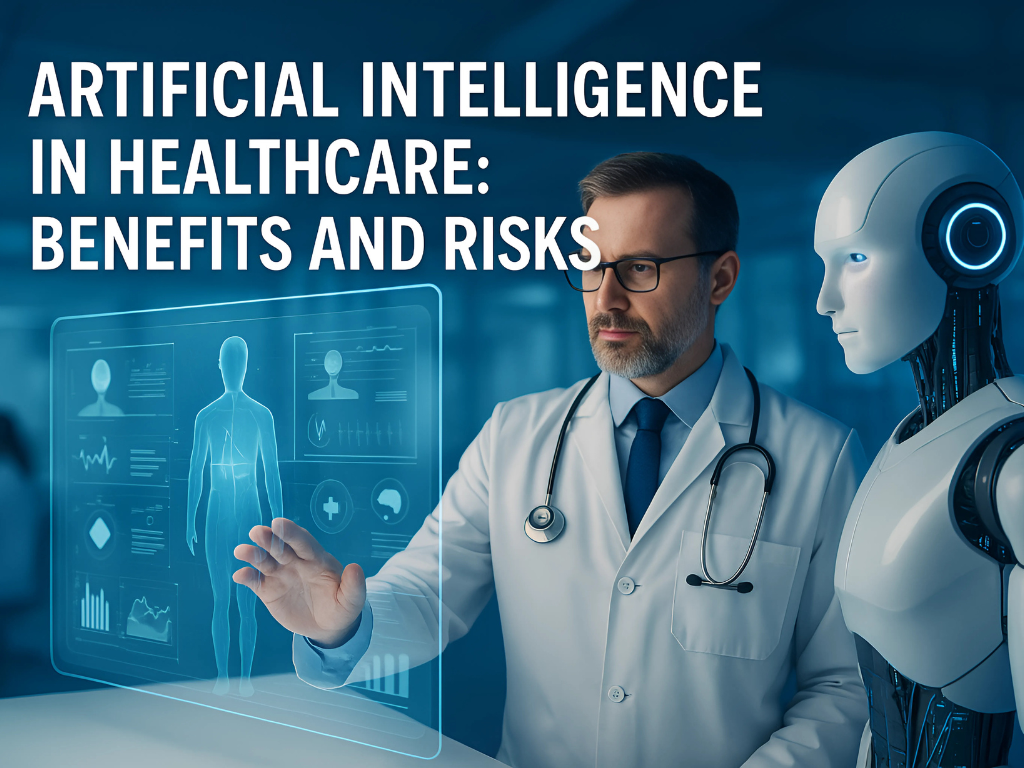AI in Healthcare: Benefits and Risks
Artificial Intelligence in Healthcare: Benefits and Risks
Artificial intelligence is no longer a distant promise—it is actively shaping the future of healthcare. As AI becomes more integrated into clinical practice, an important question arises: Is AI in healthcare a danger or a vital tool? The truth lies in how we choose to use this technology. Like any powerful innovation, AI’s impact depends largely on responsible implementation. To truly understand its role, it’s crucial to evaluate both the benefits and risks of AI in healthcare with clear insight.
Recent findings, as highlighted in Modern Healthcare, show a significant increase in the use of generative AI tools by clinicians. This trend highlights both the enthusiasm and caution surrounding AI’s rapid adoption in medical practices.

Positive Impact of Artificial Intelligence in Healthcare
1. Reducing Administrative Burden
One of healthcare’s most persistent challenges is documentation. Generative AI now helps by transcribing patient interactions into structured clinical notes. This shift enables clinicians to focus more on patient care rather than paperwork, directly addressing efficiency issues and reducing physician burnout.
2. Enhancing Diagnostic Accuracy
AI’s ability to process and analyze large datasets enables earlier and more accurate detection of critical conditions like heart disease and cancer. Algorithms trained on medical imaging and electronic health records (EHRs) have become vital tools that augment, not replace, clinician judgment.
3. Supporting Mental Health Care
AI systems are being developed to assist in the early detection of mental health conditions by analyzing speech patterns and other behavioral data. Although still emerging, these tools offer the potential to help healthcare providers identify patients who might otherwise go undiagnosed.
Risks and Challenges of Artificial Intelligence in Healthcare
1. Risk of Errors
Generative AI models can sometimes produce “hallucinations”—confident but incorrect outputs. In healthcare, such mistakes could lead to severe consequences if not properly overseen by trained professionals.
2. Data Privacy Concerns
Healthcare data is highly sensitive, and the use of AI increases the need for robust security measures. Protecting patient information must be a top priority to maintain trust and comply with privacy regulations.
3. Ethical and Professional Implications
Overreliance on AI could diminish clinicians’ critical thinking and ethical decision-making skills. Complex medical decisions often require empathy, contextual understanding, and professional judgment—qualities that AI, regardless of advancement, cannot replicate.
Artificial intelligence in healthcare should not be seen as a replacement for human professionals but as a powerful collaborator. While AI enhances the speed, accuracy, and accessibility of healthcare services, it lacks the human qualities necessary for truly patient-centered care. The future of healthcare lies in a partnership where AI complements, rather than replaces, human expertise.
When used wisely and ethically, AI can augment healthcare professionals’ capabilities and lead to better outcomes for patients. Understanding both the benefits and risks of AI in healthcare is crucial to unlocking its full potential in shaping a healthier future.
At Executive Search Associates, we leverage advanced AI tools to streamline our recruitment processes and deliver more accurate results for our clients. AI acts as an extra set of eyes, often identifying insights and patterns that even the most experienced professionals might overlook—enhancing our ability to match the right talent with the right opportunity.
Andrea Ribeiro – Marketing & Operations Manager
📩 Need help with healthcare talent solutions? Contact us today to learn more!
🔗 Follow us for more insights on LinkedIn.
